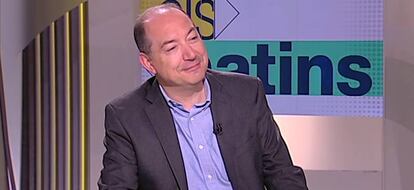TV-3 must be neutral
The future of the Catalan public broadcaster will depend on its campaign coverage during the upcoming elections

Catalonia’s public broadcaster has failed to live up to its duties of impartiality and public service. TV-3 and Catalunya Ràdio have been used as propaganda tools for separatist theories, and their programming has contributed to creating a biased vision of reality. A complete lack of plurality has resulted in a disproportionate amount of pro-secession representatives in TV and radio debates, systematically leaving detractors in a minority position. And topic selection has prioritized the interests of the pro-independence agenda, while ignoring other matters that might have been of interest to citizens. Much of this bias has been expressed by blaming Spain for any negative aspect of reality.
When Article 155 was applied, there was an option to take over Catalonia’s public broadcaster
We have said in the past, in connection with Spanish broadcaster RTVE, that public radio and television should not function as an extension of government, or as a delivery tool for the party in power. Catalan public media outlets have endured periods of extreme partisanship, and it is no coincidence that one of the first measures undertaken by the government of Artur Mas upon its return to power was to revert the reforms that had been introduced by the previous three-party coalition to avoid government control over public media. It is similar to [Spanish Prime Minister] Mariano Rajoy’s moves against the reforms approved by his Socialist predecessor, José Luis Rodríguez Zapatero.
Right now, control over Catalan public media is in the hands of the parliamentary majority, and the result of that became evident with the appointment of TV-3’s current chief, a self-professed supporter of independence who got the job not so much for professional reasons as for ideological ones.
We expect an exquisitely neutral coverage of the election campaign
TV-3 is not just a partisan television station: it is a TV station at the service of a cause. It is not just the news that is permeated by all things related to the secessionist drive. Indeed, all programming is determined by the dialectics of us-versus-them, where everything to do with “us” is positive and everything to do with “them” is typically negative.
This attitude permeates everything from children’s programs to comedy shows, where secessionists are made fun of in a gentle way while unionists are treated with contempt. This spirit has been taken to great lengths: the satirical program Polònia was suspended over a judge’s decision to hold several Catalan government members in pre-trial detention; the show’s producers alleged that they did not feel like laughing that day.
The programming at TV-3 seeks to establish parameters for interpreting reality that will be favorable to the independence cause; this explains a resolution by the Election Board to stop describing Carles Puigdemont as a “president in exile,” ignoring the fact that he was ousted and has fled Spain to avoid the justice system.
When Article 155 of the Spanish Constitution was applied, there was an option to take over Catalonia’s public broadcaster. This was ultimately not done because there was no consensus, but also to avoid accusations of undermining freedom of expression in the region. Catalonia is now facing a crucial election, for itself and for Spanish democracy as a whole. It is extremely important for public news organizations to respect the plurality of Catalan society. We expect an exquisitely neutral coverage of the election campaign from them – for the sake of society and for their own sake as well, as their future depends on it.
English version by Susana Urra.
Tu suscripción se está usando en otro dispositivo
¿Quieres añadir otro usuario a tu suscripción?
Si continúas leyendo en este dispositivo, no se podrá leer en el otro.
FlechaTu suscripción se está usando en otro dispositivo y solo puedes acceder a EL PAÍS desde un dispositivo a la vez.
Si quieres compartir tu cuenta, cambia tu suscripción a la modalidad Premium, así podrás añadir otro usuario. Cada uno accederá con su propia cuenta de email, lo que os permitirá personalizar vuestra experiencia en EL PAÍS.
¿Tienes una suscripción de empresa? Accede aquí para contratar más cuentas.
En el caso de no saber quién está usando tu cuenta, te recomendamos cambiar tu contraseña aquí.
Si decides continuar compartiendo tu cuenta, este mensaje se mostrará en tu dispositivo y en el de la otra persona que está usando tu cuenta de forma indefinida, afectando a tu experiencia de lectura. Puedes consultar aquí los términos y condiciones de la suscripción digital.








































